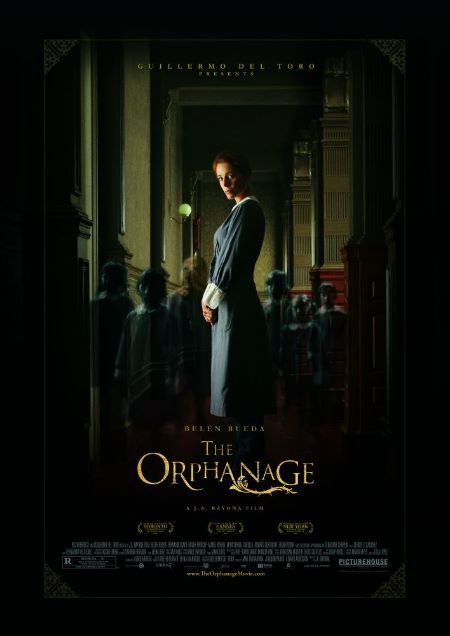Rating of
3.5/4
'Believe and you will see...'
danand82 - wrote on 09/07/08
The Orphanage is not a horror film and it is not directed by Guillermo del Toro.
These two common misconceptions have followed the film around since it's release. The former can perhaps be dismissed as semantics but the latter bears some semblance to the belief several years ago that Quentin Tarantino had directed Hero (2002). The major difference is that del Toro is a genuinely talented director and Tarantino is an over-rated adolescent. But that's another rant for another day.
The Orphanage was actually directed by Juan Antonio Bayona, in his feature film debut, though it could easily be mistaken for del Toro's work. Best known for his comic book movies Blade II (2002) and Hellboy (2004), The Orphanage is more tonally similar to some of his Spanish language work, particularly The Devil's Backbone (2001) and elements of Pan's Labyrinth (2006). However indebted Bayona is to films of this type he still manages to carve out a niche for himself with a suspenseful, emotional and technically accomplished ghost story.
I mentioned before that I did not consider The Orphanage to be a horror film and I stand by that assertion. Although the horror genre has always been difficult to define I would rather refer to this movie as an exercise in suspense mixed with a good old-fashioned ghost story. This does not mean that the film is not scary, far from it. There are jump scares and horror clichés aplenty but the film is smart enough to play with these conventions in a number of smart ways.
A married couple with an ailing, adopted son move to a mansion in the country with the intention of setting up a care home for disabled children. The title of the film refers to the fact that the mother was also an orphan and the house is the orphanage where she spent her youth. An initial flashback to this time shows us that Laura was happy here and she clearly wants to help other young children now. Her son, Simon, seems content in the new house, especially as he finds a number of new invisible playmates. He and his new friends play games, including a frantic treasure hunt, and his parents are generally tolerant of his childish delusions. The initial pacing of the film is gentle, coming to a head with Simon's sudden disappearance and Laura's desperate attempts to find him. She is willing to go to any lengths to be reunited with her son. The events which make up the latter half of the film are sometimes shocking, often intensely creepy and move at a fast pace towards the inevitable but heart-wrenching conclusion. It ticks all the stereotypical boxes for this kind of film - old dark house, creepy children, loud noises, even a surprisingly elaborate sequence involving a medium - but manages to feel fresh through a number of unique twists. The use of children's games is especially effective, with one memorable moment employing just the right mixture of tension and outright fear.
The cinematography is gorgeous but inobtrusive, certain shots are stunning when taken on their own but do not detract from the flow of the film. The use of cg within the film is subtle, something which non-American productions seem much better at. Visual effects are used to add to a scene rather than overpower it, except in the strangely cg-heavy title sequence. It is an anachronism in an otherwise technically sparse film and was most likely tacked on late in the game. The performances are likewise terse. Most notable is Belén Rueda as Laura; managing to play the distraught mother with commendable subtlety rather than the usual perfunctory hysterics. The performances of children are more difficult to critique. Suffice it to say that most of the young cast are blissfully silent and the son, Thomas (Roger Princep) does a fine job with some challenging material.
And there is yet another element which sets this film apart from its' contemporaries. It is in Spanish and, perhaps unfairly, this only adds to the overall sense of mystery. Even with subtitles, there is a more active engagement when we are viewing something that is not in our native language. We are not as focussed on what the characters are saying, instead we really see them, their interactions with their environment and eachother. I genuinely believe that this linguistic divide makes the film more effective and scarier. And make no mistake, this film is scary. True it has more in common with the short, sharp shocks of The Others (2001) than the hysteria-inducing gore and violence of Haute Tension (2003) but the insidious intrusion of the supernatural into the domestic is truly chilling.
The Orphanage is a highly effective ghost story with some interesting twists on the sub-genre that manages to maintain a constant level of dread and suspense. The resolution is shocking but also manages to retain an element of hope, as well as an insight into a possible view of the afterlife. I would strongly recommend this film for anyone who is tired of the assembly line abattoir of American horror – where tanned teens' barely one-dimensional lives are ended in a spray of (usually off-screen) viscera. If you have any brain-cells functioning after being subjected to such films, The Orphanage may give you a few sleepless nights but, after all, isn't that what a good ghost story is for...




